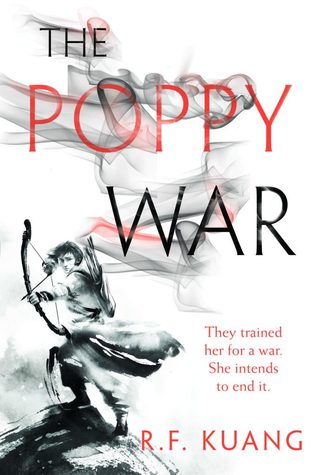A lesson in war and humanity: The Poppy War book review

Photo by Gurneer Sidhu
Published in 2018, The Poppy War has become popular amongst readers for its well written elements of grim dark fantasy: a sub genre of fantasy with a tone that is particularly violent.
When I first heard about R.F. Kuang’s The Poppy War, it was advertised to me as a young adult fantasy with an enemies-to-lovers plot. A third of the way through the book, however, I realized that I had been mistaken. For a book that heavily draws inspiration from the Second Sino-Japanese War, one of the darkest and bloodiest moments in Chinese history, this book is far from how it was described to me. This book is about military strategy, collapsing empires, mad gods, and the human ability to make awful, ruthless decisions.
The Poppy War is the story of war orphan Fang Runin, nicknamed Rin. When her adoptive parents attempt to marry her off to a middle-aged merchant at the age of fourteen, Rin is desperate to find an escape. She ends up setting her eyes on the Keju: an incredibly difficult standardized test that permits only the smartest in the nation to attend national boarding schools. After she receives the highest score in her province, Rin attends Sinegard, the most prestigious and elite military school in the nation. With dangerous gods and signs of another violent war brewing, Rin finds herself stuck as the only one who can put a halt to it.
With every book I read, I try to choose one thing that stands out the most for me, but with The Poppy War, I had a hard time deciding what that was. Having to choose between the seamless world building, its well fleshed-out characters, and the beautiful writing, I didn’t know how to. But then it hit me: the book’s portrayal of war.
The book makes it known that by engaging in warfare, someone has to lose the moral high ground. This is shown through the brutal descriptions of the battlefield, the toll it takes on the characters, and how much Rin has to sacrifice because of it. Kuang forces Rin to accept responsibility when committing terrible actions. Through Rin, the book in some ways becomes a character study of how power corrupts and how madness consumes. She harms herself, she forces herself to recieve a hysterectomy, and puts herself through mental and physical torture to keep the power that has been given to her.
For me, this commentary on the brutality of war was what made me not just like this book, but fall in love. Kuang depicts the trauma that war has caused not just to individual characters, like Rin, but also to entire nations. The explicit content that this book covers isn’t put in to simply add to the “grim dark book” it advertises itself as. The explicit content is in there because it is vital to the narrative of how war brings out the darkest parts of humanity. When I learned that this book was heavily based on the real-life events of the Second Sino-Japanese War, it made me realize the genius of this book. By having the most frightening pages of this book, that include genocide, rape, and war, be inspired by events of our own history, Kuang forces her readers to reflect. She forces us to reflect on the terrifying events in her story and realize that these aspects of her fantasy book aren’t fantastical at all. They actually happened in human history, less than a century ago. It forces her readers to learn a lesson about war: it brings out the very worst of humanity.
There were some extremely sensitive topics covered in the book that readers should know about before they pick it up. As I have already said, The Poppy War is a book heavily inspired by events that took place in the Second Sino-Japanese War, such as the Rape of Nanking — a mass period of wartime rape and murder committed by the Japanese Army against civilians of Nanjing, China. If topics like rape, war, violence, genocide, or self-harm are sensitive topics for you, this is not the book for you. They are all included with heavy detail.
This book is raw and painful. It destroyed me in the best possible way. However, The Poppy War is also incredibly thought-provoking. It was capable of keeping me thinking about it weeks after I’d closed the book. Without a doubt, I will be reading The Poppy War’s sequels: The Dragon Republic and The Drowning Faith. I highly recommend it to those who know they can deal with the book’s sensitive content.

Coming back for her last year on Bear Facts, Gurneer will be Spotlight Editor for the second year in a row. Outside of Bear Facts, she participates in...
